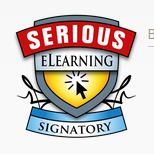In addition to accredited study and work skills, digital badges can provide rich insights into a person’s wider interests and their engagement with their professional community.
While this doesn’t seem to be happening widely yet, I can see value in digital badges for attending and particularly presenting at conferences and workshops, membership of professional organisations or communities of practice and other activities which showcase someone’s interests and experiences.
I have to admit that even my badge backpack is pretty bare but one badge that I’m happy to display is one that marks me as a signatory of the Serious e-Learning Manifesto (because who doesn’t like a good manifesto after all). It’s really just a statement of principles around good eLearning design but as I scan the web, I sometimes get a little solidarity jolt when I see someone else with this badge and maybe I pay just a little more attention to what they have to say.

Anyway, digital badges can provide badge readers with an opportunity to develop a deeper understanding of a badge holder and their interests and passions beyond the acquisition of work skills and knowledge.
Have you come across digital badges being used in this way? What else might we be able to do with them? I quite like the idea of being able to click on a badge to find a list of all the other people that hold that badge.
